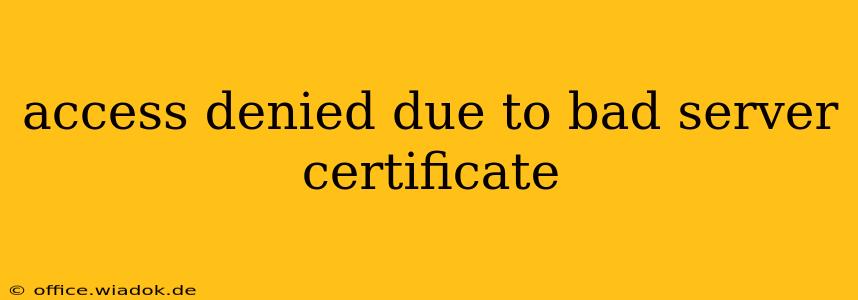Encountering an "Access Denied due to Bad Server Certificate" error message can be frustrating. This comprehensive guide will delve into the reasons behind this issue, explain the security implications, and provide practical solutions to help you regain access to the website or application you're trying to reach.
What Causes a "Bad Server Certificate" Error?
This error typically arises when your browser or device detects a problem with the website's Secure Sockets Layer (SSL) certificate. Several factors can contribute to this:
-
Expired Certificate: The website's SSL certificate has expired, meaning its validity period has ended. This renders the certificate invalid, and your browser will refuse to establish a secure connection.
-
Self-Signed Certificate: Some websites might use self-signed certificates for testing or internal use. These certificates aren't issued by trusted Certificate Authorities (CAs), leading your browser to flag them as untrusted.
-
Incorrect Certificate Configuration: A misconfiguration on the website's server can lead to an improperly installed or presented certificate. This could involve problems with the certificate chain or mismatched domain names.
-
System Clock Issues: An incorrect date and time setting on your computer can cause your browser to deem the certificate invalid, even if it's technically still valid.
-
Compromised Certificate: In rare cases, a website's certificate might have been compromised, signaling a potential security threat. Your browser will prevent access to protect you from malicious activity.
-
Outdated Root Certificates: Your device might lack the latest root certificates necessary to validate the website's SSL certificate. This is less common with automatic updates, but can occur on older systems or devices.
Security Implications of a Bad Server Certificate
Ignoring a "Bad Server Certificate" error is strongly discouraged. Accessing a website with an invalid certificate exposes you to several risks:
-
Man-in-the-Middle Attacks: A malicious actor could intercept your communication, potentially stealing sensitive data like usernames, passwords, or credit card information.
-
Data Breaches: An invalid certificate could indicate a compromised website, making your data vulnerable to theft or unauthorized access.
-
Malware Infection: Visiting a site with a questionable certificate can expose you to malware downloads or phishing attempts.
How to Resolve the "Bad Server Certificate" Error
The solution depends on the root cause. Here's a breakdown of troubleshooting steps:
1. Check the Date and Time on Your Device
Ensure your computer's system clock is correctly set. An incorrect date and time can lead to certificate validation failures.
2. Check the Website's URL
Double-check that you're typing the website's address correctly. Typos can sometimes lead to similar errors.
3. Proceed with Caution (Advanced Users Only)
If you fully understand the risks and trust the website, some browsers offer options to bypass the certificate error. However, this is generally not recommended unless you're absolutely certain about the website's legitimacy. This should only be done for trusted internal networks or websites you are certain about.
4. Clear Your Browser's Cache and Cookies
Sometimes, outdated cached information can interfere with certificate validation. Clearing your browser's cache and cookies might resolve the issue.
5. Update Your Browser and Operating System
Outdated browsers and operating systems may lack the latest root certificates or security updates. Ensure both are up-to-date.
6. Contact the Website Administrator
If the problem persists, contact the website's administrator to report the certificate error. They'll need to investigate and fix the underlying issue with their SSL certificate.
Preventing Future "Bad Server Certificate" Errors
- Use Updated Browsers: Regularly update your browser to receive the latest security patches and root certificate updates.
- Be Wary of Unfamiliar Websites: Exercise caution when visiting unfamiliar or untrusted websites.
- Check the Certificate Details: Most browsers allow you to view the certificate details, including the issuer and validity period. Look for any red flags.
By understanding the causes and security implications of "Access Denied due to Bad Server Certificate" errors, you can take appropriate action to protect your data and ensure safe online browsing. Remember to prioritize security and contact the website administrator if you encounter persistent issues.

